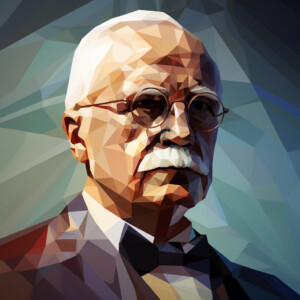Carl Jung Quotes
- Psychiatrist
- Switzerland
- 1875 - 1961

Carl Jung (1875-1961) was a Swiss psychiatrist and psychoanalyst who founded analytical psychology. He is best known for his theories of the collective unconscious, archetypes, and the psychological complex. His most notable works include Psychological Types, The Structure and Dynamics of the Psyche…Read More
Carl Jung (1875-1961) was a Swiss psychiatrist and psychoanalyst who founded analytical psychology. He is best known for his theories of the collective unconscious, archetypes, and the psychological complex. His most notable works include Psychological Types, The Structure and Dynamics of the Psyche, and Memories, Dreams, Reflections. Jung’s theories have had a profound influence on modern psychology, and his work continues to be studied and applied in many fields.Read Less
Carl Jung (1875-1961) was a Swiss psychiatrist and psychoanalyst who founded analytical psychology. He is best known for his theories of the collective unconscious, archetypes, and the psychological complex. His most notable works include Psychological Types, The Structure and Dynamics of the Psyche, and Memories, Dreams, Reflections. Jung’s theories have had a profound influence on modern psychology, and his work continues to be studied and applied in many fields.

176 Insightful Carl Jung Quotes
Carl Jung Career Highlights
Carl Jung was a Swiss psychiatrist and psychoanalyst who founded analytical psychology. He was born in 1875 and died in 1961. He is best known for his theories of the collective unconscious, archetypes, and the psychological complex. He was also a prolific writer, publishing over 20 books and numerous articles. He was a close associate of Sigmund Freud, and their relationship had a profound influence on the development of psychoanalysis.
5 Lesser-Known Facts about Carl Jung
1. Jung was a polymath who had a wide range of interests, including philosophy, anthropology, archaeology, literature, and religion.2. He was a pioneer in the field of dream analysis and the interpretation of symbols.3. He developed the concept of synchronicity, which is the idea that events can be connected by meaning rather than by cause and effect.4. He was a proponent of the use of active imagination, which is a technique for exploring the unconscious mind.5. He was a proponent of the use of psychotherapy to treat mental illness.
Key Contributions by Carl Jung
Jung’s key contributions to psychology include his theories of the collective unconscious, archetypes, and the psychological complex. He also developed the concepts of introversion and extroversion, which are still widely used today. He was a pioneer in the field of dream analysis and the interpretation of symbols. He developed the concept of synchronicity, which is the idea that events can be connected by meaning rather than by cause and effect. He was also a proponent of the use of active imagination, which is a technique for exploring the unconscious mind.
What Sets Carl Jung Apart
Jung was a polymath who had a wide range of interests, including philosophy, anthropology, archaeology, literature, and religion. He was a pioneer in the field of dream analysis and the interpretation of symbols. He developed the concept of synchronicity, which is the idea that events can be connected by meaning rather than by cause and effect. He was a proponent of the use of active imagination, which is a technique for exploring the unconscious mind. He was also a proponent of the use of psychotherapy to treat mental illness.
Takeaways
Carl Jung was a Swiss psychiatrist and psychoanalyst who founded analytical psychology. He was a polymath who had a wide range of interests, including philosophy, anthropology, archaeology, literature, and religion. He was a pioneer in the field of dream analysis and the interpretation of symbols. His key contributions to psychology include his theories of the collective unconscious, archetypes, and the psychological complex. He developed the concept of synchronicity, which is the idea that events can be connected by meaning rather than by cause and effect. He was a proponent of the use of active imagination and psychotherapy to treat mental illness.






